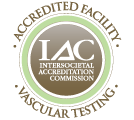Cardiac Catheterization
Cardiac Catheterization – What Is It?
Cardiac catheterization is a minimally invasive procedure that is performed by using wires, catheters and x-ray (angiogram) to diagnose and treat problems in the blood vessels of the heart.
How the Procedure Works
A long, thin tube called a catheter is inserted into a blood vessel in the arm, groin or neck and is then threaded through the blood vessels of the heart. The procedure is performed in a hospital by a cardiologist and takes approximately one hour to complete. Patients are awake during the procedure but will feel little to no pain and may be given medication to help them relax.
What to Expect
Before the procedure, patients will receive instructions about what to eat or drink. On the day of the procedure, they will receive an IV with a mild sedative. This will aid with relaxation without causing them to lose consciousness. The area where the catheter is inserted will be cleaned and shaven by a nurse, and then numbed using a local anesthetic. The doctor will use a needle to puncture the skin and access a large blood vessel. A sheath will be inserted into the vessel before the doctor inserts the catheter. Once it is threaded through, the catheter’s position will be visible on a video screen. While it is possible that patients may feel some pressure at the insertion site, no pain should be experienced.
Different instruments may be placed on the tip of the catheter, depending on the type of test or procedure being administered. Once completed, the doctor will remove the catheter and sheath. A special closure device may be used and the nurse will apply pressure to the site to limit bleeding. Patients should have someone available to drive them home afterwards.
Why is Cardiac Catheterization Done?
The procedure is done to diagnose or treat cardiovascular conditions. The test performed during the procedure will determine if there are any diseases in the heart’s muscle tissue, valves or arteries. In addition, an accurate reading of the pressure and blood flow of the heart can be taken.
Types of tests or procedures administered with cardiac catheterization:
- Dye test: The catheter may contain a special type of dye that travels through the bloodstream to the heart, making the coronary arteries visible in x-rays. This will help determine if there is plaque buildup.
- Ultrasound: During the cardiac catheterization, the doctor may use an ultrasound to get a detailed image of the arteries.
- Sample retrieval: The procedure may be completed to take blood samples, which can be measured to read the oxygen levels in each heart chamber. Heart tissue samples may also be taken to study under a microscope, a process known as a biopsy.
- Percutaneous coronary intervention (PCI): A minor surgical procedure may be completed that is similar to angioplasty, where stenting is used to open narrow or blocked coronary arteries.
- Coronary angioplasty: This is a minor procedure similar to PCI, where arteries are opened using a balloon.
- Chamber tests: Tests may be performed to determine the pressure within the four chambers of the heart, gauge the contraction ability of the pumping chambers, or identify any defects.
- Valvuloplasty: The catheter may be used to widen a narrow heart valve opening.
What are the Risks?
There is very little recovery time and low risk of any complications from a cardiac catheterization. Some patients may experience bruising or discomfort at the site where the catheter was inserted. It is rare, and usually not serious, but some patients may also experience an allergic reaction to the dye that is used to make arteries visible in X-rays.
At The Vascular Experts, we use cardiac catheterization to help diagnose and treat patients who are suffering from a blockage or narrowing of the arteries. Years of experience, and commitment to using the newest technology for diagnostics, enable our team to diagnose and treat patients with accuracy, speed and efficiency. We pride ourselves on the high level of care and treatment options offered to patients for a variety of heart-related issues.



